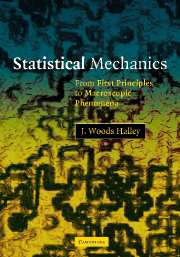Book contents
- Frontmatter
- Contents
- Preface
- Introduction
- Part I Foundations of equilibrium statistical mechanics
- Part II States of matter in equilibrium statistical physics
- 5 Perfect gases
- 6 Imperfect gases
- 7 Statistical mechanics of liquids
- 8 Quantum liquids and solids
- 9 Phase transitions: static properties
- Part III Dynamics
- Appendix: Solutions to selected problems
- Index
9 - Phase transitions: static properties
Published online by Cambridge University Press: 05 June 2012
- Frontmatter
- Contents
- Preface
- Introduction
- Part I Foundations of equilibrium statistical mechanics
- Part II States of matter in equilibrium statistical physics
- 5 Perfect gases
- 6 Imperfect gases
- 7 Statistical mechanics of liquids
- 8 Quantum liquids and solids
- 9 Phase transitions: static properties
- Part III Dynamics
- Appendix: Solutions to selected problems
- Index
Summary
We begin with some thermodynamic considerations and then proceed to a discussion of critical phenomena. In discussing critical phenomena we first describe the phenomenology, then some general considerations concerning Landau–Ginzburg free energy functionals and mean field theory and finally an introduction to the renormalization group.
Thermodynamic considerations
Consider a system at fixed pressure P and temperature T. (We will not be concerned with magnetic properties yet.) We will suppose that the system contains some integer number s of molecular species. We will also suppose that we have a means of distinguishing two or more phases of this system. Though this is an assumption it requires some examples and discussion. We distinguish between phases by consideration of their macroscopic properties so a spatial as well as a temporal average is involved. For example, we distinguish gas from liquid by the difference in average density and magnet from paramagnet by the existence of a finite average magnetization in the former. (We will discuss some more subtle cases later.) But if we wish to consider (as we do here) the possible coexistence of more than one phase then a problem arises concerning the length scale over which we ought to average spatially. If, in a system containing two coexisting phases, we find the average properties by averaging over the entire system, then we will always get just one number and not two and will have no means of distinguishing the phases.
- Type
- Chapter
- Information
- Statistical MechanicsFrom First Principles to Macroscopic Phenomena, pp. 161 - 192Publisher: Cambridge University PressPrint publication year: 2006



